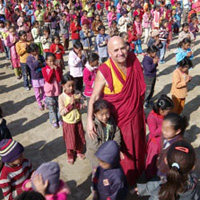“How to Be Happy”
written by Justine van der Leun for AOL Health | Published on September 29, 2010
Buddhist monk Matthieu Ricard claims you can practice your way to happiness, and he should know: After MRI scans showed that he experienced extreme levels of positive emotions and few negative ones, he became known as “the happiest man in the world.” Trained as a cell biologist in France, Ricard moved to the Himalayas in 1972 to study Buddhism. He’s now a translator, a photographer and the Dalai Lama’s French interpreter. His books — the proceeds of which go to 41 humanitarian projects in the remote Himalayas — include “The Monk and the Philosopher” (a dialogue with his father, a famed philosopher), “Happiness: a Guide to Developing Life’s Most Important Skill,” and, most recently, “Why Meditate?” AOL Health spoke with Ricard about the cultivation of happiness, the benefits of altruism and how 30 silent minutes a day can change your life.
Do you think you’re the happiest man in the world?
It’s better than the unhappiest person in the world. It was a cover line on a Buddhist independent journal. Of course it’s cute, but it doesn’t rest on scientific evidence. I took part in some ongoing studies on compassion. It’s a jump to say my results mean that.
What is happiness?
Happiness is a way of being rather than an endless search for experiences. Pleasure is fine but depends on things that are subject to change: people, places, things. Something tastes good; fire warms you when you’re cold. But then this experience turns neutral or averse: Even the most beautiful music is unpleasant after 24 straight hours. But happiness is a more durable state. It’s a cluster of basic human qualities that nurture a state of fulfillment, flourishing, of appreciating your life. It’s inner freedom, inner strength, inner peace. These are the resources to deal with the struggles of life. The more you experience happiness, the deeper and more stable it becomes.
You link meditation with happiness. Why?
Meditation is not an exotic eastern practice but is actually mind training. We all have a mind and can work with it.
So the basis of happiness is mind training?
In the sense that mind training means harnessing the potential we have for less vulnerability to provocation from outside. Meditation helps you cultivate a better emotional balance and inner freedom so you are not a slave of impulses like anger and craving.
